Picking out a new (or new to you) car is often a frustrating experience.
With more tools than ever before available for consumers, though, it can be pretty simple. But first you'll need to decide between the new vs used car. That's where we aim to help. We've talked to experts, reviewed the recommendations of others, and looked to our own experiences. Keep reading for an easy rundown of the pros and cons for each purchase. Don't worry if you don't even know where to start. Just keep reading for a step by step guide that will give you all the info you need.
Buying a New Vs Used Car
No matter which type of vehicle you choose, it's going to be a major investment. You want to make a smart choice for your family and budget. But there are some fundamental differences in the new vs used car debate.
We'll start by defining a few terms you'll probably encounter in your search. Then let's get into the details of actually finding the perfect auto for you. Whether it's new or pre-owed, we're sure the right ride is just waiting to be found.
What is a new car?
Put simply, a new car is one that has not had a previous private owner. Many drivers see this as a sign that the car won't have any existing problems. And while that is generally a safe assumption, even new cars can come with serious issues. But if you bought it new, it probably came with a pretty extensive warranty.
Of course, that assurance is one of the biggest selling points for new cars. The downside, though, is that they will almost invariably cost more. Except for the rare exotic cars that shoot up in value, most autos depreciate significantly. That means you will not be able to sell it for anywhere close to its purchase price. But if you're buying for peace of mind, it might make sense to buy new. Also, since it's deemed more reliable, you'll have more opportunity to finance it. So if you need some help paying for your ride at once, buying new provides different options.
What is a used car?
By definition, anything that is not a new car qualifies as a used car. But in the new vs used car discussion, used cars are a broader category. Maybe you remember the days of the sleazy used car salesman eager to unload a lemon. Well, you still need to be on the lookout for these opportunists. But the industry has really improved a lot over the past generation.
The internet has helped a lot. Even those dealers who don't sell online know they have to compete with those sites. So they know reviews and dissatisfied customers will have a bad effect on business. Then there are the higher end used cars. Many luxury auto brands offer certified pre-owned vehicles. These are aimed at appealing to those buyers who want new tech and quality. If you want to save some cash and don't need the absolute latest, this could be an option. Many also offer warranties on par with some new cars.
What are the advantages of a new car?
If you've ever bought a brand new car, you might already know the unique feeling. Driving off the lot with that distinct scent and a smooth ride makes you feel great. And then there are the compliments you'll get from friends, family and other drivers.
But the benefits go beyond driving a shiny new car. In comparing any new vs used car, reliability is a concern. And if you select a company with a great warranty, a new car can win in this category. Plus, you can count on the very latest tech and safety features. Even if the used model is almost identical, the new one likely has some hidden advancements. And finally, you're likely to get a better rate -- or at least more options -- in financing.
What are the advantages of a used car?
These days, there certainly seem to be far more used car advantages than in the past. First of all, there is a huge range of options. Used cars can include the 15 year old sedan you spend a few grand on for your kid. Or it could be a certified luxury car that costs as much as some houses. Either way, it'll be significantly cheaper than buying a comparable new car.
Plus, there are countless ways to search for your next used car. Whether online or at a dealership, customer service has gotten a lot better. And since tech and craftsmanship have improved, used cars are remaining reliable longer. Then, with a trip to your mechanic and a check for previous claims, you can get a clear picture. Buying a used car in previous generations was a crap shoot. But now, there are some guarantees and safeguards against taking home a lemon. Perhaps the best part of owning a used car, however, is that someone else absorbed the depreciation.
What are the drawbacks of a new car?
The last point above is a great segue for this section. Because the depreciated value of your new car is possibly the biggest downside to a new car. But if you're really interested in learning about a new vs used car, it might not be a deal breaker.
Either way, you should know what you're getting. And once you drive off the lot, your new car is likely worth a lot less than you paid. That being said, you do get all of the benefits that financial hit buys. But it stings nonetheless. Plus, you might just get the high pressure sales tactics associated with new car dealerships. Though the tech revolution and other advances has made the process less stressful. Depending on the size of your city, you might have a limited selection of new cars. Sure, big names like Ford and Honda will be plentiful. But if you want something a bit more specific, you might want to check out the used market.
What are the drawbacks of a used car?
Here's where it can get a bit tricky in the new vs used car market. Remember, not every car depreciates significantly, so make sure you're getting a bargain. And despite the possible financial benefits of buying used, there are some possible pitfalls.
Let's start with the obvious one: reliability. This is not a problem with every used car, of course. In fact, there is much more reliability in the used car market than ever before. But you usually don't know how the previous owner or owners treated your next car. There are options to check reported crashes and you might get maintenance records. But you won't necessarily know whether they revved the engine too much or slammed the brakes. That's why you'll want to take some care and extra time giving it a review. Make sure your mechanic says it's sound. Because you could be buying problems and might not have a warranty for repairs. Other things to look out for are features and specs. Buying used means you might not be able to get everything on your wish list.
How do you know which is right for you?
Sometimes it can be hard, if not impossible, to tell the difference between a new vs used car. But when you're shopping, the differences become clear. Even if a used car has practically no miles and is the same body style, it's not new. That means you will have to deal with some uncertainties. But it could very well be worth the trade off if you find the right one.
You've got to determine what is most important to you. Look at your new vs used car dealer experience and the product you'll be getting. Is it important to have the latest and greatest? Then check out next year's brand new models. Want to save some dough or get more car for your buck? Find the right used car for your budget. Either way, it is easier than ever to find, review and buy your next car. Just make sure you have all the info you need before you go shopping.
The Great New Vs Used Car Debate Rages On.
Whether that's a new or used auto, we hope our guide has made your choice a little easier. If so, share it with the car shoppers in your life. And leave us a comment below if you have any final thoughts or questions.
Related Article: Window Tint Explained: What Exactly It Is & Its Many Benefits





